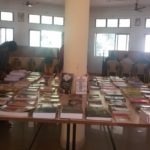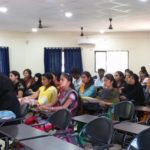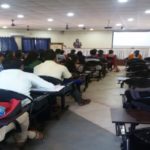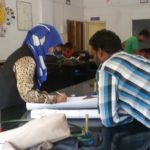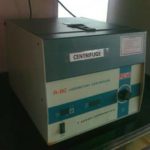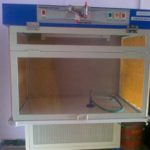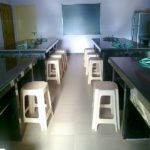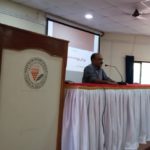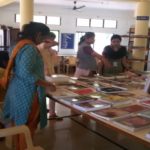About Department
Department of Microbiology was established in the year 2008-09. Since the beginning it runs the degree course on ‘self-funded’ basis. Along with the regular syllabus based information, the department has always given knowledge of Applications, Advances and Opportunities of the subject to the students.
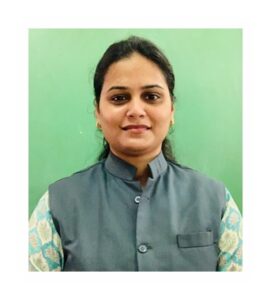
Prof. Ms. Priyanka S. Salvi
Assistant Professor (Head of the Department)
M.Sc.
Molecular Biology & Biotechnology
Year of Joining 2016
Profile
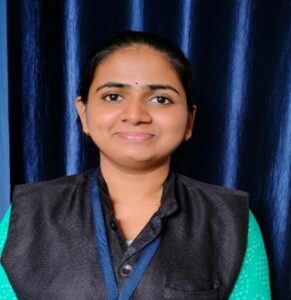
Prof. Ms. Nishigandha Nitin Bandarkar
Assistant Professor
M.Sc. Microbiology
Year of Joining 2022
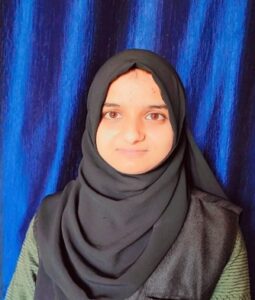
Prof. Ms. Fauziya A.Kadir Chiplunkar
Assistant Professor
M.Sc. Microbiology
Year of Joining 2022

Prof. Ms. Janhavi Sandeep Divekar
Assistant Professor
M.Sc. Microbiology
Year of Joining 2023
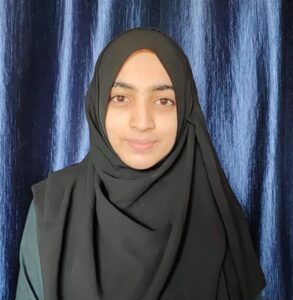
Prof. Ms. Rukhsar Khalid Mamtule
Assistant Professor
M.Sc. Microbiology
Year of Joining 2023
Profile
Mr. Vinod Jadha
Laboratory Assistant
B.Sc.
Year of Joining 2008
Smt. Manjusha Yedekar
Laboratory Assistant
Year of Joining 2017
| Year | Semester | Course | Course Code | Weightage | Credits | Syllabus |
| F.Y.B.Sc. | I | Microbiology | USMB101 | 100 | 2 | F.Y.B.Sc._Microbiology |
| Microbiology | USMB101 | 100 | 2 | |||
| Microbiology Practical | USMBP1 | 100 | 2 | |||
| II | Microbiology | USMB201 | 100 | 2 | ||
| Microbiology | USMB201 | 100 | 2 | |||
| Microbiology Practical | USMBP2 | 100 | 2 | |||
| S.Y.B.Sc. | I | Microbiology | USMB301 | 100 | 2 | S.Y.B.Sc._Microbiology |
| Microbiology | USMB302 | 100 | 2 | |||
| Microbiology | USMB303 | 100 | 2 | |||
| Microbiology Practical | USMBP3 | 100 | 2 | |||
| II | Microbiology | USMB401 | 100 | 2 | ||
| Microbiology | USMB402 | 100 | 2 | |||
| Microbiology | USMB403 | 100 | 2 | |||
| Microbiology Practical | USMBP4 | 100 | 2 |
| Year | Semester | Course | Course Code | Weightage | Credits | Syllabus |
| T.Y.B.Sc. | V | Microbial genetics | USMB501 | 100 | 2.5 | T.Y.B.Sc._Biotechnology |
| Medical microbiology and immunology 1 | USMB502 | 100 | 2.5 | |||
| Microbial biochemistry | USMB503 | 100 | 2.5 | |||
| Bioprocessed technology | USMB504 | 100 | 2.5 | |||
| Practical 1 | USMBP05 | 100 | 3 | |||
| Practical 2 | USMBP05 | 100 | 3 | |||
| Biotechnology | USACBT501 | 100 | 2 | |||
| Practical (applied) | USACBT5P1 | 100 | 2 | |||
| T.Y.B.Sc. | VI | RDNA technology ,Bioinformatics and virology | USMB601 | 100 | 2.5 | T.Y.B.Sc._Microbiology |
| Medical microbiology II | USMB602 | 100 | 2.5 | |||
| Microbial biochemistry II | USMB603 | 100 | 2.5 | |||
| Applied and industrial microbiology | USMB604 | 100 | 2.5 | |||
| Practical I | USMBP06 | 100 | 3 | |||
| Practical II | USMBP06 | 100 | 3 | |||
| Biotechnology | USACBT60I | 100 | 2 | |||
| Practical (applied) | USACBT6PI | 100 | 2 |
B.Sc.
PO1. CRITICALTHINKING
The curriculum is designed in such way that students should acquire an ability to observe accurately and objectively. They should be able to solve the problems and also think scientifically, independently and draw rational conclusions.
PO2. SCIENCE COMMUNICATION
Curriculum empowers communication skills in science which further enhances easy spread of scientific knowledge in the society.
PO3 SOCIAL INTERACTIONS
Students acquire national integration, community harmony, gender equality and nationalism which inculcate harmonized social interaction. Made aware of environment related issues.
PO4 EFFECTIVE CITIZENSHIP
Students acquire attributes of good citizens with certain ethics, made aware of environmental issues its management and planning.
PO5 ALLROUND PERSONALITY
Students develop as all-round individuals possessing variety of values and skills conferred by extracurricular activities.
Course Outcome (C.O.)
|
Class |
Course |
Course Outcomes |
|
F.Y.B.Sc. |
I |
CO-1 Learners will gain fundamental knowledge of Types of cells and their organization. CO-2 Learners will learn the scope of microbiology and the role of microbiologist. |
|
II |
CO-1 Learners will know the history of Microscopy, types of conventional and advanved microscopes and have knowledge of staining procedures using different components. CO-2 Learners will have knowledge of nutrition, cultivation and control of microorganisms. CO-3 Learners will explore various interactions of microbes in the ecosystem and hosts. CO-4 Learners will get hands on experience of usinf basic instruments like pH meter and colorimeter. |
|
|
S.Y.B.Sc. |
I |
CO-1 Learners will have fundamental knowledge microbial taxonomy. CO-2 Learners will gain detail information about structure, function and estimation of important biomolecules. CO-3 Learners will accquire knowledge of basic techniques in molecular biology and biochemistry commonly used in R & D laboratories. |
|
II |
CO-1 Students will know about various habitats and role of microbes in the ecosystem. CO-2 Learners will gain fundamental knowledge of applications of microbes in making of dairy products and other food commodities. CO-3 Learners will have thorogh information about mechanism of food spoilage and traditional and advanced methods of food preservation. |
|
|
III |
CO-1 After studying this elective course,Learners, from non-microbiology backgound will get hands with basic bacteriological techniques like microscopy, culturing, cultivation and preservation of microorganisms. CO-2 Learners will earn knowledge of commonly occuring deseases, pathogens and desease control measures. CO-3 Learners will get complete knowledge of safty practices followed at various levels like labs, industries and hospitals. CO-4 Learners will become well versed with soft skills, emerging and applied techniques/fields of microbiology like nanotechnology, biosensors, writing research material etc. |
|
|
T.Y.B.Sc. |
I |
CO-1 Learners will have thorough knowledge of molecular phenomena such as DNA replication, Mutation, Recombination and gene transfer in bacteria. CO-2 Learners will get the information about unique genetic elements like plasmids, transposons and viroids. CO-3 Learners will explore the world of viruses and understand their properties, life cycles and cytopathic effects on host cell. |
|
II |
CO-1 Learners will have detail information about commonly encountered diseases, pathogens, lab diagnosis and treatment measures. CO-2 Learners will accquire knowledge of human immune system, its components, working, reactions and disorders. |
|
|
III |
CO-1 Learners will have thorough knowledge of metabolic diversity in microorganisms and environmental phenomena related to them. CO-2 Learners will learn the role of biochemical reactions and enzymes in various life processes. CO-3 Learners will understand the molecular mechanism employed by the cells for regulation of gene expression. |
|
|
IV |
CO-1 Students will learn to deal with screening, improvement, management and exploitation of microbes for production of useful products. CO-2 Learners will understand the concept, principle, working of different types of spectroscopies. CO-3 Learners will have thorough knowledge of Intellactual Property Rights. CO-4 Learners will have sound knowledge of standard operating procedures for QA-QC in pharmaceutical and chemical industries. |
|
|
V |
CO-1 Learners will accquire knowledge about tools and techniques used in genetic engineering and industrial biotechnology and bio-informatics. CO-2 Learners will know designing of trangenetic experiments using plant and animal models. CO-3 Learners will have extra knowledge about strategies of diagnosis and curing of genetic diseases. |
Programme Specific Outcome
|
The Students graduating in the subject of Microbiology will be able to |
|
PSO-1: APPLY Learners can apply their knowledge about basic techniques of isolation, Identification and preservation of microorganisms for various experimental purposes. |
|
PSO-2: DIAGNOSE With the help of bacteriological techniques, knowledge of cultivation media, sample collection, analytical tests, learnerns can carry out disease diagnosis and suggest the treatment measures. |
|
PSO-3: ANALYSE Learners will analyse statistical as well as molecular data using biostatistical and bioinformatics methods. |
|
PSO-4: EXPLAIN AND DESCRIBE Learners will be in a position to give elaborate description of all the metabolic processes and molecular mechanisms. |
|
PSO-5: DEVELOPE AND STANDARDISE By knowing various structural and enzymatic properties of microbes and fermentation engineering, learners, will employ them for developing human/environment friendly products or processes. |
|
PSO-6: USE Learners will learn to handle various basic and analytical intruments used in laboratories. |
- Well-equipped laboratory occupying total area of 643 sq.ft.
- Instruments like
- Laminar Air Flow
- High Speed Centrifuge
- Kits & Instruments for Molecular Biology Experiments
|
Name of Student/s |
Class |
Title of the Project |
Year |
|
Chinmay V. Vaidya |
S.Y.B.Sc. |
Amrut Pani |
2015-16 |
|
Neha K. Baikar |
S.Y.B.Sc. |
Antimicrobial activity of Neem |
2016-17 |
|
Aqsa A. Karel |
S.Y.B.Sc. |
Isolation of dandruff causing fungus and effect of different herbs on the isolate |
|
|
Swarali Bhide |
S.Y.B.Sc. |
Bioremediation of high fluoride levels in ground water |
2017-18 |
|
Class |
Year |
No. of Students appeared |
Studends passed |
Result (%) |
Grade obtained by students |
|||
|
O |
A |
B |
C |
|||||
|
T.Y.BSc |
2012-13 |
14 |
12 |
85 |
– |
01 |
03 |
08 |
|
2013-14 |
09 |
08 |
88.8 |
01 |
01 |
03 |
04 |
|
|
2014-15 |
19 |
09 |
47.3 |
– |
– |
05 |
04 |
|
|
2015-16 |
18 |
08 |
44.4 |
01 |
04 |
03 |
– |
|
|
2016-17 |
19 |
09 |
47.3 |
01 |
04 |
04 |
– |
|
To start M.Sc. in Physics
- Departmental Library
Sr.No
Title of the Book
Publication/Author Name
1
Microbiology
Prescott, Harley and Kleins
2
I genetics
Russel
3
Immunology
Kuby
4
Immunology
Palan and Pathak 1st Edition
5
Immunology
Roitt and Roitt
6
Biochemistry
Veer Bala Rastogi
7
Molecular Biology
Glick and Pasterneak
8
Biotechnology
B.D. Sing
9
Microbiology
Pelczar, E.C.S.Chan, Krieg.
10
Lehninger’s Biochemistry
Nelson and Cox
11
Gene VIII
Lewin
12
Brock Biology of Microorganisms
Medigan
13
Microbiology Textbook
A.R. Jadhav
14
Microbiology Textbook
Phadke Prakashan
15.
Biochemistry and Metabolism
D.Anadhi
16.
Genetics and Geneomics
Waseem Ahmad
17.
Modern Exprimental Biochemistry
Rodney F. Boyer
18.
Microbiology: Part I &II
Bodhankar & Patil
- Consultancy :
a) Antimicrobial activity testing (informally conducted interdisciplinary consultancy)
b) Water potability testing consultancy is informally provided through personal contacts of students & teachers. - Placement: Informal
- Extra lectures: extra lectures conducted weekly
-
Sr.No.
Class
Extra lectures/ Week
1
F.Y.B.Sc
2
2
S.Y.B.Sc
2
3
T.Y.B.Sc
6
-
- Class tests (Weekly)
- Home assignments given to S.Y.B.Sc. and T.Y.B.Sc.
- Remedial lectures or sessions for academically weak or slow learners
- Educational visits
- Student Mentoring
-
Mentor Teacher
No. of Mentee Students
Class
Dr. G.S. Phadke
13
T.Y.B.Sc.
Prof. P.S.Patil
19
S.Y.B.Sc.
Prof. T.V.Yadav
16
F.Y.B.Sc.
Prof. P.S.Salvi
16
F.Y.B.Sc.
-
- Career Opportunities
1. Further up-gradation in qualification- i) M.sc. NET/SET ii) Ph.D.
iii) MBA iv) PG Diploma
2. Job options-
QA/QC officer- Industries like Pharmaceutical, Food and Beverages, Bakery, Dairy require Microbiologists for the purpose of quality testing and maintenance.
Microbiologist- For research and development of production protocols, Pharmaceutical, Food and Beverages industries appoint microbiologists. Their job is mainly to develop improved microbial strains.
MBA marketing
Teaching Jobs- After completion of master’s degree, teaching jobs are open in degree colleges of various Universities
- Industrial Visits & Industrial Trainings
- Seminars, Conferences & Workshops
- Students seminars
- Guest Lectures
- Mentoring by Alumini
- Extra Lectures
- Bridge & Remedial Programmes for Slow / Medium / Advanced Learners
- Parent Meetings
- Tutorials / Class Tests
- Home Assignments
- Linkages- industrial linkages/visits, MOUs,
- Students Placement
- Students Mentoring
- Workshops / Seminars / Conferences
Chemistry Graduates & Post Graduate can enter a wide range of professions such as:
- Pure and applied research
- Teaching
- Government Services
- Quality Control, Quality assurance & Research and development in industry
- Management, production, packaging, marketing and sales, in industries such as pharmaceuticals, foods, dyes, cosmetics, polymer, Chemical, etc.
- Consumer guidance, Nutritional consultancy, Science journalism
- Chemistry software development, Chemistry literature indexing
- Entry in civil services through competitive Examinations (UPSC, MPSC etc.)
- Entrepreneur

